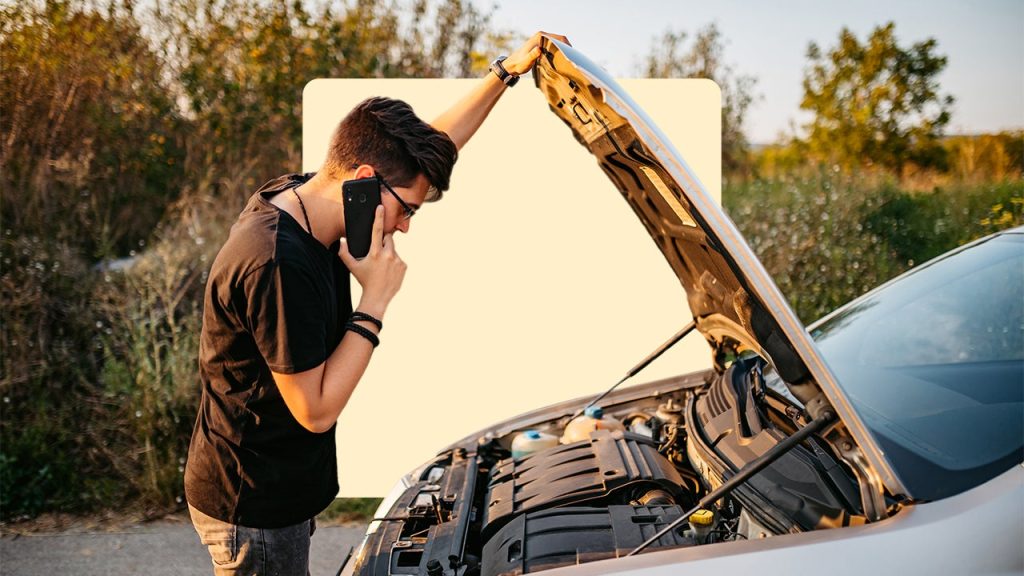urbazon/GettyImages; Illustration by Hunter Newton/Bankrate
Key takeaways
- Engine failure from normal wear and tear and mechanical problems are generally not covered by car insurance, even if you have full coverage.
- You may have coverage for engine failure if your warranty is still active or if you purchased optional mechanical breakdown insurance (MBI).
- Your engine may be covered by car insurance if the failure results from a collision, depending on your coverage and the circumstances of the accident.
How does insurance deal with engine failure?
To understand does insurance cover engine failure, it can help to be aware of the types of coverage you have. If you only have your state’s minimum liability coverage, for example, then your policy will only pay for damage and injuries to the other party in an at-fault accident — your own vehicle isn’t covered.
But does full coverage cover a blown engine? In some situations, yes — but it usually requires an external damage-causing event. Your full coverage policy provides protection to your own car through two specific types of coverage:
- Collision: As the name suggests, collision coverage pays for damages to your vehicle if you are in an at-fault accident.
- Comprehensive: Sometimes called “other than collision” coverage, this type of insurance helps pay to repair or replace your car if it is stolen, vandalized or damaged in a fire or other mishap like a severe weather event. It also covers damage from hitting an animal.
If your engine failure is due to an accident or other event covered by these two types of insurance, the damage is likely to be covered, once you pay your deductible. The catch, however, is that car insurance generally won’t cover an engine that fails due to mechanical problems or normal wear and tear.
Will gap insurance cover engine failure?
No, gap insurance generally will not cover engine failure. This coverage option pays the difference between your car’s book value after it is totaled and the amount you owe on your car loan. It’s intended to help cover your costs after an accident or other vehicle mishap, not to cover engine failure that results from mechanical issues or wear and tear. If you are looking at how to get insurance to cover a blown motor, gap insurance will probably not help you.
This coverage is very specific and only activates if your car is totaled in a covered claim and you owe more than what the car is worth. It does not provide coverage for engine failure, normal wear and tear or other mechanical problems with your vehicle.
Will my insurance cover towing if my engine fails?
If you purchased roadside assistance as an optional policy add-on, your insurance should cover towing if your engine fails. Roadside assistance provides reimbursement after requesting emergency services, such as repairing a flat tire, jumping a car battery or, like in this instance, needing a tow.
However, using roadside assistance generally counts as a claim (albeit a small one), so repeatedly requesting it could cause your provider to raise your rates or cancel your roadside assistance plan altogether. This will vary from provider to provider, but it’s generally best to save roadside assistance claims for true emergencies, like needing a tow after your engine fails in the middle of nowhere.
Is there any coverage that does cover engine failure?
Outside of a covered accident, the ‘how’ to get insurance to cover blown motors will require more than what your standard policy has to offer. Most often, things like engine failure will be covered by a warranty if you have purchased one. However, you also may want to consider purchasing mechanical breakdown insurance (MBI), if your car insurance company has it available.
Warranty
You may have purchased a warranty with your new or late-model used car. A warranty is a contract that covers repairs or replacement needed either for your whole car or for specific systems in your car. It may cover repairs that your insurance wouldn’t cover, but generally will not pay for normal wear and tear, neglect or maintenance issues. There are two common types of warranty:
- Bumper-to-bumper warranty: As the name suggests, this type of warranty covers most of a vehicle’s parts and systems, and generally lasts three to five years. It may cover parts and labor for defects that are discovered, and could provide financial assistance after an engine failure, depending on the cause. If a part or system is not covered by this type of warranty, it is generally mentioned in the warranty documents.
- Powertrain warranty: This type of warranty is more limited, and generally covers repairs or replacement of the car’s powertrain — that is, the engine, transmission, driveshaft and all other components that help the car to move. Only the parts and systems mentioned in the warranty documents are covered, anything else is excluded.
Warranties are usually in effect for a certain period of time or number of miles. For example, you might have one that is valid for three years or 30,000 miles, whichever comes first.
Mechanical breakdown insurance
Mechanical breakdown coverage (MBI), also called car repair insurance, is similar to a warranty in that both cover the costs of select repairs to essential components in your vehicle. MBI can be purchased as an endorsement to an existing car insurance policy or as a standalone policy, and unlike warranties, it usually includes a deductible. In most cases, it would cover engine failure.
MBI may be a good option for you if you have a higher-value car, such as a luxury vehicle, which would be costly to repair. It can also be worth considering if you have a new car, don’t have a warranty and want to avoid being saddled with expensive repairs in the event of a breakdown or engine failure.
Some, but not all, insurance companies offer this type of insurance. The average cost of a policy with MBI will vary from carrier to carrier, so you may want to ask for quotes from several insurers to see who offers you the best rate.
Frequently asked questions
Why we ask for feedback
Your feedback helps us improve our content and services. It takes less than a minute to
complete.
Your responses are anonymous and will only be used for improving our website.
Help us improve our content
Read the full article here









